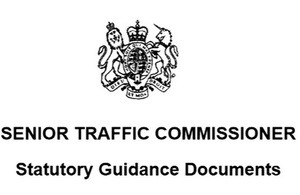
Mobility and Transport Road Safety
Initial Qualification and Periodic Training of Professional Drivers
Directive 2003/59/EC of the European Parliament and of the Council of 15 July 2003 on the initial qualification and periodic training of drivers of certain road vehicles for the carriage of goods or passengers, amending Council Regulation (EEC) No 3820/85 and Council Directive 91/439/EEC and repealing Council Directive 76/914/EEC
Directive Classifications
EUROVOC Descriptors
Drivers
Professional Qualifications
Carriage of Goods
Carriage of Passengers
Road Transport
Continuing Vocational Training
Subject Matter
Directory Code
07.20.30.20 Transport Policy
NOTE: Questions relating to Initial Qualification and Periodic Training subject matter, website content, Technical or Professional Education (TPE) information provided should be submitted through our contact page where we will be pleased to get back to you with an answer in due course.
OUR POLICY: It is our policy not to change or charge for information that is freely available in the public domain thus ensuring equal access and fair competition rules to all undertakings can be applied to our product and service users within scope of the European Qualification Framework (EQF) for Lifelong Learning. To ensure fairness our core product is based on working time – mobile road transport activities and occupational safety and health requirements at work.
PRODUCTS AND SERVICES: Our products and services are externally checked to ensure they are up to date and for quality purposes. We provided Information, Advices and Guidance (IAG) in real time which may be subject to political and/or regulatory change. If you require clarification of any points in Directive 2003/59/EC or further assistance please contact us via our contact page.
NOTE: Incorrect implementation of directive 2003/59/EC has the potential to put the following at risk and put UK Business at a competitive disadvantage;
- Learners (post mainstream education) and new entrants to the sector
- LGV/PSV drivers
- Training providers
- Business leaders
- Organisations/vehicle operators
Initial Qualification and Periodic Training (Certificate of Professional Competence) Certification
Section 1: List of subjects
The knowledge to be taken into account by Member States when establishing the driver’s initial qualification and periodic training must include at least the subjects in this list. Trainee drivers must reach the level of knowledge and practical competence necessary to drive in all safety vehicles of the relevant licence category.
The minimum level of knowledge may not be less than level 2 of the training-level structure provided for in
Annex I to Decision 85/368/EEC(1), i.e. the level reached during compulsory education, supplemented by professional training to Syllabus requirements and within scope of The Vehicle Drivers (Certificate of Professional Competence) Regulations 2007
UK Road Transport analysis and research on sector issues;
- Research and analysis [Driver CPC periodic training] Quality assurance and compliance 2013 to 2014
- Transport Committee. Road Haulage sector: Skills and workforce planning inquiry. Debate the driver shortage.
- The Scottish Parliament. Debate the driver shortage.
- UK Government unveils measures to help learner drivers and punish dangerous drivers. Including £2 million for research into driver education.
- Traffic Commissioners open consultation on vocational driver conduct with proposals to penalise and/or suspend professional drivers’ licences (CPC holders) for time management, load management and/or vehicles related offences.
Section 2. Initial Training
- Driver CPC Syllabus
- Advanced training in rational driving based on safety regulation
- Application of Regulations
- Health, road and environmental safety, service, logistics
- Road Safety compulsory education
- Professional drivers’ skills matrix
- Foundation CPC Framework
- Resource Locator
Section 2.1. CPC certifying an accelerated initial qualification
- In accordance with Article 3(2), Member States shall require trainee drivers to attend courses in an approved training centre. These courses shall cover all the subjects referred to in section 2.
- This training shall conclude with the test provided for in section 3. That test shall be organised by the Member States‘ competent authorities or an entity designated by them and shall serve to check whether, for the aforementioned subjects, the trainee driver has the level of knowledge required in section 2. The said authorities or entities shall supervise the test and, upon successful completion, issue the drivers with a CPC certifying an accelerated initial qualification.
Section 2.2. Periodic Training
- Periodic training shall consist of training to enable holders of a CPC as referred to in section 3 and the drivers referred to in section 2 to update the knowledge which is essential for their work, with specific emphasis on road safety and the rationalisation of fuel consumption.
- This training shall be organised by an approved training centre, in keeping with section 2. If a driver moves to another undertaking, the periodic training already undergone must be taken into account.
- Periodic training shall be designed to expand on, and to revise, some of the subjects referred in section 2.
Section 3: National Standard for Driver and Rider Training
- Education and Training Policy
- Driver Training,
- Training,
- Training Centres,
- Test.
- The training centres taking part in the initial qualification and periodic training must be approved by the Member States’ competent authorities. Approval may be given only in response to a written application. The application must be accompanied by documents including:
- a suitable qualification and training programme specifying the subjects taught and setting out the proposed implementing plan and teaching methods;
- the instructors’ qualifications and fields of activity;
- information about the premises where the courses are given, the teaching materials, the resources made available for the practical work, and the vehicle fleet used;
- The conditions regarding participation in the courses (number of participants).
- The competent authority must give approval in writing subject to the following conditions:
- The training must be given in accordance with the documents accompanying the application;
- The competent authority must be entitled to send authorised persons to assist in the training courses of the approved centres, and must be entitled to monitor such centres, with regard to the resources used and the proper running of the training courses and tests;
- The approval may be withdrawn or suspended if the conditions of approval are no longer complied with.
- The approved centre must guarantee that the instructors have a sound knowledge of the most recent regulations and training requirements. As part of a specific selection procedure, the instructors must provide certification showing knowledge of both the subject material and teaching methods. As regards the practical part of the training, instructors must provide certification of experience as professional drivers or similar driving experience, such as that of driving instructors for heavy vehicles.
- The programme of instruction must be in accordance with the approval and must cover the subjects in the list in section 2.
- New law to give equal air time to non-academic Technical and Professional Education (TPE) careers advice and apprenticeships
Section 4: Statutory Guidance
Driving Test Standards
Large Goods Vehicles (LGV) Drivers’
Public Service Vehicle (PSV) Drivers’
Driver CPC Qualification Standards
Updates to Statutory Documents on Areas of Operator Licensing and Decision Making
The Senior Traffic Commissioner for Great Britain, Beverley Bell, has today (14 December 2015) published a revised set of statutory documents.
The documents were reviewed to meet the traffic commissioners’ (TCs’) strategic objectives of reducing the burden on compliant operators, targeting those who put road safety at risk and achieving more consistent outcomes when dealing with the conduct of professional drivers.
Beverley Bell said:
“The changes to the statutory documents are designed to streamline processes, extend delegation to our staff and give better guidance so that decisions can be made more quickly. These changes will help to deliver a more efficient and effective licensing regime for compliant operators”.
Publications explaining the legal basis and the way traffic commissioners will approach the exercise of their statutory functions.
Traffic commissioners licence and regulate:
- heavy goods vehicle (HGV) operators
- public service vehicle (PSV) operators
- large good vehicle (LGV) vocational drivers
- passenger-carrying vehicle (PCV) vocational drivers
In England, Scotland and Wales.
Part of: Senior Traffic Commissioner’s statutory guidance and statutory directions, Local transport and Road safety
These documents explain the legal basis and the way traffic commissioners will approach the exercise of their statutory functions.
Each document below provides guidance and sets out:
How to use the Senior Traffic Commissioner’s statutory guidance and statutory directions.
The requirements for satisfying good repute or fitness.
How the requirements for available finance might be met.
The requirements for satisfying professional competence.
The requirement to have an operating centre and stable establishment.
How traffic commissioners are to be satisfied as to the legal status of applicants and operators.
Vocational driver conduct matters to be referred to traffic commissioners by the Secretary of State for Transport (through DVLA).
The process by which impounding appeals will be considered.
The matters that traffic commissioners routinely delegate to staff acting on their behalf and deputy traffic commissioners.
The way, in which traffic commissioners and staff delegated to act on their behalf, approach the management of casework.
How commissioners approach the legislative requirements and when the potential impact of any regulatory action might be relevant.
The administration and practicalities for making decisions available to interested parties.
The requirements of traffic commissioners and staff acting on their behalf in relation to appeals.
Guidelines to traffic commissioners, the limousine industry and the public on the operation of minibuses, limousines and similar vehicles.
The punctuality and reliability standards for the operation of registered local bus services.

